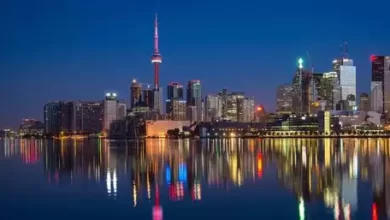When is Laylatul Qadr 2022? Date and time for the Night of Power in Ramadan

Islamic teaching says that Allah first revealed the opening verses of the Qur’an to the Prophet Muhammad on one of the odd-numbered nights of the last 10 nights of Ramadan
The last 10 days of Ramadan are a particularly holy time (Photo: Getty)

By Alex Finnis
Reporter
April 24, 2022 5:19 pm(Updated April 24, 2022 5:20 pm)
Muslims around the world are currently fasting for Ramadan, meaning they cannot eat or drink anything during the hours of daylight.
Fasting during Ramadan is one of the five pillars of Islam – the fundamental rules worshippers must follow – and carries great significance during the holy month.
At the end of the month Muslims celebrate Eid al-Fitr, with festivities lasting up to three days.
But before that comes one of the holiest days in the Muslims calendar – Laylatul Qadr, also written Laylat al-Qadr or Lailatul-Qadr.
Here’s everything you need to know about it.
When is Laylatul Qadr 2022?
Laylatul Qadr takes place during the final 10 days of Ramadan.
Ramadan is divided up into three 10-day splits, known as Ashras. Ashra means 10 in Arabic.
Islamic teaching says that Allah first revealed the opening verses of the Qur’an to the Prophet Muhammad on one of the odd-numbered nights of the last 10 nights of Ramadan.
It is unknown exactly which, but many Muslims choose to mark Laylatul Qadr on the 27th night of Ramadan.
For those that observed the first night of Ramadan on 2 April, this means Laylatul Qadr will fall on the night of Friday 29 April.
In London fasting is set to end at 8.29pm on that date. Times will vary slightly depending on where you are in the country. You can see a full timetable by location here.
What is Ramadan?
Ramadan is the ninth month of the Islamic calendar, and marks the time when the Quran is said to have been revealed to Prophet Muhammad by God with a month-long fast. Its name literally means “scorching heat” in Arabic.
Muslims are required to spend a period of 30 days abstaining from food and drink, including water, during daylight hours, as a means of celebrating and reflecting on their faith.
Fasting during Ramadan is one of the five pillars of Islam along with the Shahadah (declaration of faith), Salat (prayer), Zakat (charity) and the Hajj pilgrimage.
During Ramadan, there is an increased offering of the Salat, with Muslims giving thanks to Allah, while the fasting ritual allows them to understand the suffering of others.
Those observing the fast are encouraged to read the Quran and the holy text is recited at the Tarawih, special nightly prayers that are held throughout the month.
What is the meaning behind it?
Laylatul Qadr is also known as the Night of Decree or the Night of Power.
The last 10 nights of Ramadan are considered to be some of the best of the year, while the Qur’an says Laylatul Qadr is “better than a thousand months”.
It is the night on which the Angel Gabriel is believed to have been sent down from the heavens by God to recite the opening verses of the Islamic holy book to the Prophet Muhammad.
As such, this is a night on which Muslims believe Allah bestows blessings, answers prayers and forgives sins.
How do Muslims mark it?
Prayer is the most important part of Laylatul Qadr. Many Muslims stay up all night to pray, which is known as Qiyam.
Muhammad is believed to have said: “Whoever stays up and prays on Laylatul Qadr out of faith and in the hope of reward, his previous sins will be forgiven.”
Hundreds and even thousands of Muslims will gather at the largest mosques and pray together on this night.
Another important part of Laylatul Qadr is Dua, which is making supplications. As the Prophet Muhammad said: “Oh Allah, you are forgiving and you love to forgive, so forgive me.”
Additional weight is also placed on good deeds during these final 10 nights of Ramadan.
When is Eid al-Fitr?
Eid al-Fitr is held immediately after Ramadan, meaning it is expected to fall on 2 May this year.
Celebrations can last up to three days, depending on where you are in the world.
Its name comes from an Arabic term that translates as the “feast of breaking the fast”, and although not a public holiday in the UK, it is in many Muslim countries.
Eid al-Fitr is one of two major festivals celebrated by Muslims each year, the other being Eid al-Adha, which falls later in the summer and honours Abraham’s willingness to sacrifice his son to Allah.
It is seen as a spiritual celebration of Allah’s gift of strength and endurance. It is also a time for charity, known as Zakat al-Fitr, when people are expected to give and show kindness.
Fasting is forbidden on the day of Eid, in contrast to the 30 days that came before.
Eid celebrations will begin with prayers at dawn, which usually take place at a mosque, although lockdown restrictions might affect the number of people allowed in a place of worship.
The holy day is heavily focused on family and friends, with many in the community meeting up to share food and stories.




